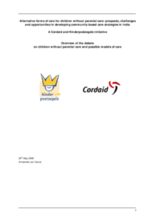The United Nations Convention of the Right of the Child affirms that it is in the overriding interest of children that they be brought up in their own families. But there are growing numbers of children who do not enjoy this most basic right and suffer from neglect and extreme vulnerability. The emotional, educational, spiritual and physical needs of children who live without parental care are often neglected and they may resort to dangerous activities to survive.
For many decades children without parental care, were cared for in institutions or in foster-homes. Recent studies stress the importance of a family environment for the development of a child. Experience in different countries has shown that through specific measures the child can remain with their parent(s) or a close relative. A number of alternative forms of care have been developed in which the extended family and the community play a central role.
Some experts in the field of childcare are still skeptical of these developments, however, stressing the risk of abuse of the child. Other experts underline that institutional- and foster care are also not without risk for the child. Many of the organisations working with and caring for children without parental care are not fully aware of these new insights.
In this document, Cordaid and Kinderpostzegels have taken the initiative to further the discussion on the advantages and disadvantages of different forms of care and to stimulate partner organisations and other interested nongovernmental organisations in Asia to take up alternatives of care for children without parental care within their regular activities by:
-
providing them with sufficient information to make a well-informed decision on the way forward
-
allow them to link up and network with institutions with a expertise in this field and similar organisations with practical experience and/or struggling with similar issues.
Cordaid and Stichting Kinderpostzegels Nederland are of the opinion that all children have to be cared for and not just looked after and that the ideal environment for a child is a family, not an institution.
We believe that separation from his/her family should be as temporary as possible, unless the child experiences any form of exploitation, abuse or neglect in the family. In that case it is still preferential for a child to grow up in a family or family-like environment - though not its own family - because of the support and affection, necessary for the healthy development of a child, it can offer.
©Stichting Kinderpostzegels Nederland

